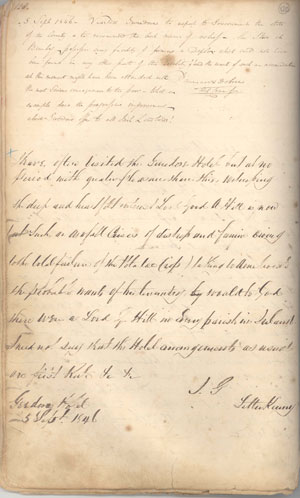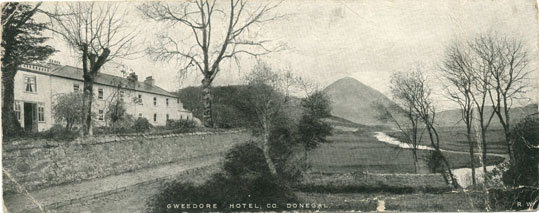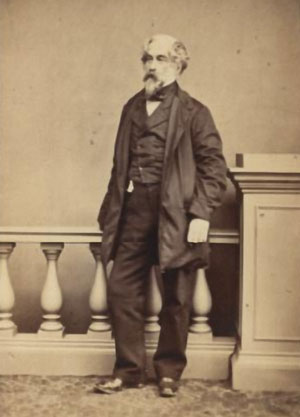GWEEDORE HOTEL VISITORS’ BOOKS, 1842–74
Published in Issue 6 (November/December 2022), Volume 30By Niamh Brennan
Donegal County Archives hold two visitors’ books for the Gweedore Hotel, owned by Lord George Hill (1801–79), son of the Marquess of Downshire, Co. Down. In 1838 Hill purchased a large estate in Gweedore. He is best remembered in Donegal for the opposition he faced in his attempts over the years to replace the traditional rundale system with modernised farming practices.
Hill’s Gweedore Hotel opened in 1842. One of the first to make an entry in the visitors’ book was his brother Arthur. The tone of his entry is one of condescension towards the people of west Donegal:
‘I feel an interest in [Donegal people’s] welfare which must depend on their own merit … I hope that Lord George’s excellent object, that of improving the mountainous district, possessed as it is of many natural advantages, will ere to be crowned with well merited success’ (31 August 1842).
The hotel became a popular destination for the wealthy and influential classes, even in the midst of the staggering poverty of the surroundings. Both visitors’ books contain a vast array of comments, essays, poems and treatises. Themes varied from the deeply serious to the more light-hearted, from praise of the landlord to shock at the effects of the Great Famine, criticism of tenants and awe at the natural beauty of the rural setting.
The many notable visitors included the Downshire family; Thomas Campbell Foster, author of Letters on the condition of the Irish people (1846); the writer Thomas Carlyle; Dr William Robert Wilde, surgeon and father of Oscar Wilde; and Asneath Nicholson, a renowned female American Quaker who visited Ireland and wrote about the Famine.
There were also many visitors from the surrounding areas, such as Sir James Dombrain, a landowner in nearby Dunlewey and comptroller general of the Irish Coastguard. As a Famine Relief Commissioner, he was deeply interested in Hill’s reforms. In September 1846 he expressed admiration for Hill’s actions:
‘The tenants upon his lordship’s estate have all been placed in separate and distinct holdings well fenced and drained; their cottages are clean and comfortable and the people (from being the most lawless) have been brought into habits of industry and good order and all this has been effected without hardship or severity; his lordship possesses that quiet firmness coupled with mild and affable disposition which has worked its way to the hearts of the people and enable him to overcome difficulties which to most other would have been insurmountable.’
It is not likely, however, that many of Hill’s tenants would have agreed with Dombrain’s sweeping statements on the success and merits of these reforms.
Not every visitor was an unequivocal cheerleader for the landowning classes as a whole. The writer Thomas Carlyle on 4 August 1849 fervently praised Hill whilst urging other landlords to emulate him:
‘Have seen Gweedore, with joyful astonishment, with many feelings not to be written. Could bid all Irish landlords, “See examine; go and do likewise!”—Join, with all men, in wishing every prosperity to such an enterprise.’
On 5 September 1846, ‘J.G.’ from Letterkenny (below) commented that he or she had
‘… often visited the Gweedore Hotel but at no period with greater pleasure than this Wednesday. The deep and heartfelt interest Lord George Hill is now, at such an awful crisis of distress and famine owing to the total failure of the potato crop, showing to [alleviate] the probable wants of his tenantry. Would to God there was a Lord G Hill in every parish in Ireland.’
It may seem inappropriate to openly express personal pleasure whilst lamenting the national disaster of the Famine but such was the eclectic nature of the comments of the hotel visitors at that time.
Not every person made a political comment, even those deemed the most political. Members of the Young Irelanders, John Mitchell and John O’Hagan, visited on 19 August 1845 and left with a short message praising the accommodation and the ‘attention of the servants’. William Smith O’Brian, visiting on 18 August 1847, exhorted people to ‘Persevere’, but this was his only comment. The failed Young Ireland rebellion took place just a year later, in July 1848.

Above: Extract from the Gweedore Hotel’s visitors’ book, 5 September 1846, from ‘J.G.’ of Letterkenny.
Many of the comments on the Famine were insensitive, deeply patronising and intensely didactic:
‘Much distress is at present felt in this district in consequence of the failure of the potato crop, a calamity with which it has pleased divine providence to afflict the kingdom in general this year. It must be admitted that the Irish have too long subsisted on almost exclusively and been content with this lowest denomination of food, a new system must rather be adapted and tenantry on this estate may congratulate themselves on having a landlord residing amongst them, anxious to instruct and improve them, disposed to anticipate and alleviate their wants and to elevate their moral and social condition, and they will show themselves not only ungrateful but blind to their true interests if they don’t second his benevolent efforts and strenuously cooperate with him in carrying out his useful and enlightened views …’ (A. Durham, 14 October 1846).
There were, however, a few non-judgemental comments:
‘The patient endurance of the people in their present suffering truly amazes me in this part of the country’ (H.B. Tollemache, London, March 1847).
Some years after the worst of the Famine, in December 1857, a writer signing himself only ‘Shaun’ dissented from the more common views expressed in the books:
‘For sheep destruction, landlord rule and comfort “rich and rare”, Gweedore is famed through Erin’s isle, this notebook doth declare,
but tenant slaves are crouching here, beneath their tyrant’s sway,
and grimly curse the hour their moors became the Scotchman’s prey.
And though the traveller must confess, Lord George Hill has striven well
to make his stay right pleasant here at this his own hotel,
yet truth will urge the candid man to speak his feelings free
and cry against the power he wields against his tenantry.’
To view both Gweedore Hotel visitors’ books and the photo album of the Hill and Knight families, see https://www.donegalcoco.ie/culture/archives/.
Niamh Brennan is Archivist of Donegal County Council’s Archives Service.


















